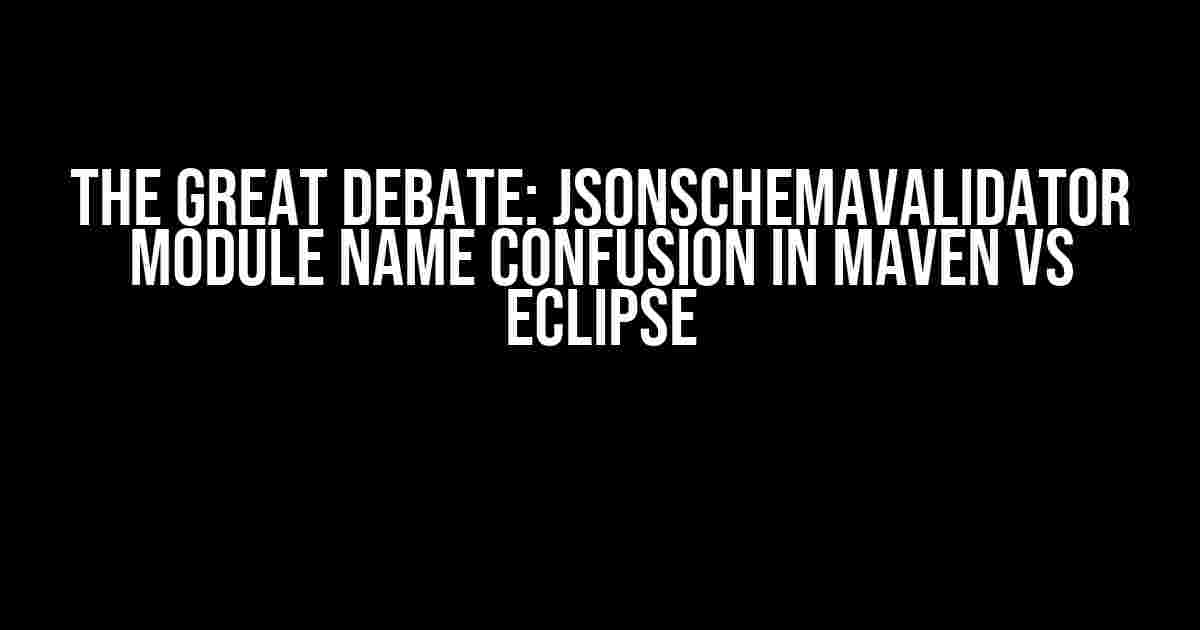Are you tired of scratching your head, wondering why your JsonSchemaValidator module name is causing chaos in your Maven and Eclipse projects? Fear not, dear developer, for you are not alone! In this article, we’ll dive into the depths of this confusion, and emerge with a clear understanding of how to tame the beast that is JsonSchemaValidator module naming.
The Problem: Maven vs Eclipse Module Name Conventions
The root of the confusion lies in the different module naming conventions used by Maven and Eclipse. Maven follows a more traditional, Java-based naming convention, while Eclipse uses a more flexible, OSGi-based approach. This disparity can lead to frustration and confusion when trying to integrate JsonSchemaValidator into your project.
Maven Module Naming Convention
In Maven, module names typically follow the format groupId:artifactId:version. For example:
<groupId>com.example</groupId>
<artifactId>json-schema-validator</artifactId>
<version>1.0.0</version> This format is straightforward and easy to understand. However, when it comes to JsonSchemaValidator, things get a bit more complicated.
Eclipse Module Naming Convention
In Eclipse, module names are based on the OSGi framework and follow the format Bundle-SymbolicName. For example:
<Bundle-SymbolicName>com.example.json.schema.validator</Bundle-SymbolicName> Note the difference in case sensitivity and the omission of the version number. This disparity can lead to errors and inconsistencies when trying to integrate JsonSchemaValidator into your Eclipse project.
Solutions to the Confusion: Maven
So, how do you avoid the confusion and ensure seamless integration with JsonSchemaValidator in your Maven project? Follow these steps:
-
In your
pom.xmlfile, declare the JsonSchemaValidator dependency with the correct module name:<dependency> <groupId>com.github.fge</groupId> <artifactId>jackson-coreutils</artifactId> <version>1.12</version> </dependency> -
Use the correct imported package in your Java code:
import com.github.fge.jsonschema.core.report_processing.ProcessingMode; -
Verify that your Maven project is configured to use the correct Java version:
<maven.compiler.source>1.8</maven.compiler.source> <maven.compiler.target>1.8</maven.compiler.target>
Solutions to the Confusion: Eclipse
Now that we’ve covered Maven, let’s move on to Eclipse. To avoid the JsonSchemaValidator module name confusion in your Eclipse project:
-
Create a new Eclipse project and select the “Plug-in Project” option:

-
In the “New Plug-in Project” wizard, enter the correct Bundle-SymbolicName:
Bundle-SymbolicName: com.example.json.schema.validator -
In the “Dependencies” tab, add the JsonSchemaValidator bundle:
<bundle>com.github.fge.json-schema-validator</bundle> -
Verify that your Eclipse project is configured to use the correct Java version:
<java.version>1.8</java.version>
Troubleshooting Common Errors
Even with the correct configuration, you may still encounter errors. Here are some common issues and their solutions:
| Error | Solution |
|---|---|
| JsonSchemaValidator module not found | Verify that the JsonSchemaValidator dependency is declared correctly in your Maven project or added as a bundle in your Eclipse project. |
| java.lang.NoClassDefFoundError | Check that the correct Java version is configured in your Maven project or Eclipse project. |
| OSGi framework errors | Ensure that the correct Bundle-SymbolicName is used in your Eclipse project and that the JsonSchemaValidator bundle is correctly added as a dependency. |
Conclusion
In conclusion, the JsonSchemaValidator module name confusion in Maven vs Eclipse can be a frustrating experience. However, by understanding the different module naming conventions and following the solutions outlined in this article, you can ensure seamless integration of JsonSchemaValidator into your projects. Remember to stay vigilant and troubleshoot common errors to avoid headaches down the line.
With this newfound knowledge, go forth and conquer the world of JSON schema validation with confidence!
Happy coding!
Frequently Asked Question
Got stuck with the JsonSchemaValidator module name confusion between Maven and Eclipse? Don’t worry, we’ve got you covered!
What is JsonSchemaValidator and why is it causing issues?
JsonSchemaValidator is a module that helps validate JSON data against a predefined schema. The confusion arises when Maven and Eclipse use the same module name for different purposes, leading to conflicts and errors. This FAQ aims to clarify the differences and provide solutions to avoid these issues.
How does Maven use JsonSchemaValidator?
In Maven, JsonSchemaValidator is used as a plugin to validate JSON data during the build process. It ensures that the JSON data conforms to a specified schema, helping maintain data quality and consistency.
How does Eclipse use JsonSchemaValidator?
In Eclipse, JsonSchemaValidator is used as a module for validating JSON data in Eclipse projects. It provides real-time validation and error reporting, making it easier to develop and debug JSON-based applications.
What causes the conflict between Maven and Eclipse JsonSchemaValidator?
The conflict arises when both Maven and Eclipse try to use the same JsonSchemaValidator module, leading to versioning issues, duplication of efforts, and errors. This can happen when you’re working on a project that requires both Maven build validation and Eclipse project validation.
How can I resolve the JsonSchemaValidator conflict between Maven and Eclipse?
To resolve the conflict, you can use separate versions of JsonSchemaValidator for Maven and Eclipse. For Maven, use the Maven JsonSchemaValidator plugin, and for Eclipse, use the Eclipse JsonSchemaValidator module. Alternatively, you can exclude the JsonSchemaValidator module from one of the tools to avoid duplication.

